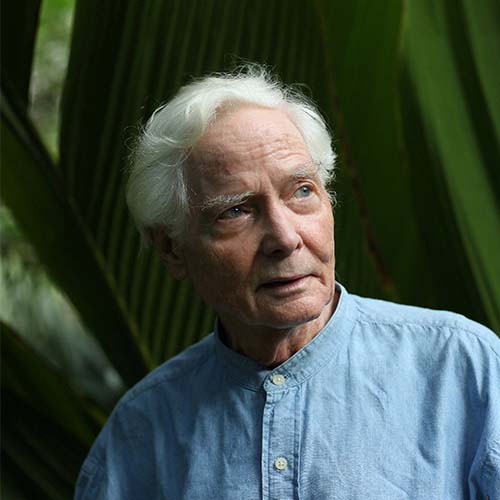Visiting Poets
W.S. Merwin
W.S. Merwin began his life in poetry at age five, writing hymns for his minister father’s Presbyterian services. Author of eighteen books of poetry, five books of prose, and translator of twenty works of European and Asian languages, Merwin has been awarded most of the major prizes in American letters, including the Yale Series of Younger Poets Award (1952, for A Mask for Janus), the Pulitzer Prize (1970, for The Carrier of Ladders), the Bollingen Prize, and the first Tanning Prize for mastery in the art of poetry.
As a Princeton graduate in the 1950s, Merwin traveled in western Europe, finding his affinity for translation while tutoring Robert Graves’ son in Majorca. His translation work has ranged widely, from The Song of Roland to Euripedes to the poetry of Russian Osip Mandelstam to Neruda’s Twenty Love Poems and a Song of Despair. Recipient of the 1968 PEN Translation Prize for his Selected Translations, Merwin’s more recent translations include East Window (The Asian Translations), collections by Jaime Sabines, Roberto Juarroz, Muso Soseki, and Dante’s Purgatorio.
The influence of Graves and Blake are evident in the formalism and mythological themes of Merwin’s own early work. By the sixties, though, with The Moving Targetand The Lice, he was experimenting with metrical irregularity and “open forms,” creating the signature enjambment and syntactic suspension that has allowed him to dispense with punctuation entirely, even in recent long narrative poems.
A typical Merwin poem – easily identifiable and widely imitated – is elusive, enigmatic, and often disquieting. Merwin’s varied and prolific literary career is entwined with his pacifist, anti-imperialist, environmentalist values and activism. Merwin has a “talent for the desolate and dismembered,” writes the critic Helen Vendler. “He is one of the voices singing out of empty cisterns and exhausted wells . . . finding his hollow divinities.”
In poems marked by a severe and tenuous beauty, Merwin explores human perception and the capacity of language to express experience; he ponders the passage of time, the unreliability of memory, and man’s perplexity in the face of a troubled planet. As the poet Peter Davison writes, he “engages the underground stream of our lives.”
W.S. Merwin lives in Hawaii where he keeps a garden of rare and endangered palm trees.
Select Poems
Naturally it is night.
Under the overturned lute with its
One string I am going my way
Which has a strange sound.
This way the dust, that way the dust.
I listen to both sides
But I keep right on.
I remember the leaves sitting in judgment
And then winter.
I remember the rain with its bundle of roads.
The rain taking all its roads.
Nowhere.
Young as I am, old as I am,
I forget tomorrow, the blind man.
I forget the life among the buried windows.
The eyes in the curtains.
The wall
Growing through the immortelles.
I forget silence
The owner of the smile.
This must be what I wanted to be doing,
Walking at night between the two deserts,
Singing.
From THE MOVING TARGET (Atheneum, 1963)
On the last day of the world
I would want to plant a tree
what for
not for the fruit
the tree that bears the fruit
is not the one that was planted
I want the tree that stands
in the earth for the first time
with the sun already
going down
and the water
touching its roots
in the earth full of the dead
and the clouds passing
one by one
over its leaves
From THE RAIN IN THE TREES (Alfred A. Knopf, 1988)
My face in the train window no color
years later taking me by surprise
when remembered looking older of course
behind it the fields I had known that long
flashing through it once again before I could
catch them the afternoon light the small lane
swinging by where an old man was walking
with a dog and their shadows while the face
raced past without moving and was neither
the daylight going nor the sight of it
once a snake left its whole skin by my door
still rustling without breath without a sound
all of a piece a shade out in the air
the silent rings in which a life had journeyed
From THE PUPIL (Alfred A. Knopf, 2001)
Poetry Center Reading
Spring 2003Spring 2013

